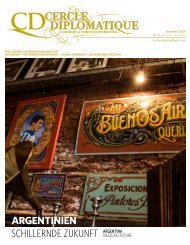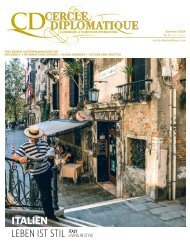CERCLE DIPLOMATIQUE - issue 02/2019
CD is an independent and impartial magazine and is the medium of communication between foreign representatives of international and UN-organisations based in Vienna and the Austrian political classes, business, culture and tourism. CD features up-to-date information about and for the diplomatic corps, international organisations, society, politics, business, tourism, fashion and culture. Furthermore CD introduces the new ambassadors in Austria and informs about designations, awards and top-events. Interviews with leading personalities, country reports from all over the world and the presentation of Austria as a host country complement the wide range oft he magazine.
CD is an independent and impartial magazine and is the medium of communication between foreign representatives of international and UN-organisations based in Vienna and the Austrian political classes, business, culture and tourism. CD features up-to-date information about and for the diplomatic corps, international organisations, society, politics, business, tourism, fashion and culture. Furthermore CD introduces the new ambassadors in Austria and informs about designations, awards and top-events. Interviews with leading personalities, country reports from all over the world and the presentation of Austria as a host country complement the wide range oft he magazine.
You also want an ePaper? Increase the reach of your titles
YUMPU automatically turns print PDFs into web optimized ePapers that Google loves.
LE MONDE COMMENTARY<br />
Iran 1979 - <strong>2019</strong><br />
Aerial view on Tehran<br />
(top) and a „Women only“<br />
train carriage sign on the<br />
floor of Tehran‘s metro.<br />
A colourful mosque in the city.<br />
focus here is living our dreams under those pressures<br />
as an omnipresent aspect of life that permeates all our<br />
thoughts and actions‘, explains Amin. Young people<br />
did not benefit in any meaningful way from the JC-<br />
POA.<br />
The so called «Revolution Babies« have experienced<br />
moments of heavy and serious political tension<br />
but also witnessed a brief cut in sanctions after the<br />
nuclear deal. However, after Donald Trump reinstated<br />
them when he withdrew from the agreement in<br />
2018, people lost hope. The slogan «DOWN WITH<br />
US« once again fixed people‘s attention on the chronic<br />
problems between Tehran and Washington.<br />
The fear about new US-oil sanctions leads to frustration<br />
in May <strong>2019</strong>.<br />
The big Islamic Revolution in 1979 was meant to<br />
bring education progress, social advance, and a better<br />
economic situation to the Islamic Republic. There<br />
was also a big interest to share Iran‘s profit-making<br />
oil-industry. ‘The Cat‘ (Iran) owns the world‘s second<br />
largest gas and the fourth largest oil reserves,<br />
thus making it the biggest source of combined hydrocarbon<br />
deposits in the world. Now, 40 years later,<br />
we are witnessing high unemployment. At least one<br />
in four graduates can not find work, according to the<br />
International Monetary Fund (cf. ‘Forty years later‘<br />
@euronews.com), which predicts an unemployment<br />
rate of 14 percent in <strong>2019</strong>. The Iranian government<br />
sees, of course, the bright side: Due to the latest<br />
government statistics of the Islamic Republic, nearly<br />
all Iranians can read today - compared to only 47<br />
percent of the population in 1976. Much more people<br />
also attend better education, with university enrolment<br />
being at a top level now.<br />
What remains to be seen now is if young people<br />
will accept new pressure due to the US-sanctions or<br />
if they will start to protest again. But one thing is quite<br />
clear: With their stylish clothes, effortless English<br />
and modish hair, the young people will create their<br />
own future. If Europeans or Americans visit Iran,<br />
they will see that the country is really different from<br />
what they were thinking about. It is a modern country<br />
with a modern and curious young population,<br />
much friendlier than you would ever believe. ‘Wearing<br />
a blue scarf does not mean being stupid or old<br />
fashioned‘, says Elahe, a 29-year-old French teacher<br />
in Tehran, and she adds: ‘A great introduction to<br />
some of the country‘s rich cultural attractions is the<br />
literary institute in Shiraz, which has a reputation as<br />
a city of great poems and poets such as Hafez. Come<br />
and spend some days with us here in Iran and then<br />
you can judge‘.<br />
PHOTOS:ADOBETSOCK<br />
PHOTOS: AFP PHOTO/ ATTA KENARE“PICTUREDESK.COM; ADOBETSOCK<br />
1979<br />
The Islamic Revolution began in January 1978 with<br />
major demonstrations against Shah Mohammad Reza<br />
Pahlavi. The Shah, already suffering from cancer, could<br />
not handle the following year of strikes and<br />
demonstrations, and fled the country.<br />
In February 1979, Ruhollah Khomeini returned from his<br />
exile in Paris to Tehran and formed a new government.<br />
Two referendi held in 1979 brought a new theocratic<br />
constitution (December 1979) and an Islamic Republic<br />
(April 1979) to Iran.<br />
On 4 November 1979, some Muslim students seized the<br />
United States Embassy and took 90 hostages at the<br />
beginning. The US refused to return Pahlavi to Iran to<br />
face trial. Attempts by the Jimmy Carter administration<br />
to release the hostages, and a failed rescue attempt<br />
helped force out Carter and brought Ronald Reagan to<br />
power in Washington. As a result of the so called<br />
“Algiers Accords“, the last hostages were finally set free<br />
on Carter‘s final day in office.<br />
1980<br />
Abdolhassan Banisadr becomes the first President of<br />
the new Islamic Republic of Iran.<br />
1981<br />
Ali Khamenei becomes President.<br />
1980-1988<br />
On 22 September 1980, the Iraqi army invaded the<br />
western Iranian province of Khuzestan, launching the<br />
Iran-Iraq-war with a lot of Iranian casualties. In 1988,<br />
Khomeini accepted a truce mediated by the United<br />
Nations. During the war, over 1 million educated<br />
Iranians left the country.<br />
February 1989<br />
Fatwa of Khomeini to kill Salman Rushdie<br />
June 1989<br />
Khomeini dies. Ali Khamenei (who gets now the title<br />
‘Ayatollah‘ without the religious education) becomes<br />
Supreme Leader and Ali Rafsanjani becomes<br />
President.<br />
1995<br />
US-sanctions against Iran (for support of terrorism)<br />
1997<br />
The moderate reformist Mohammad Khatami<br />
becomes President for 2 periods and tries to build<br />
political bridges to Europe.<br />
1999<br />
Demonstrations of reformist students - the hardliners<br />
and the army arrest most of them.<br />
20<strong>02</strong><br />
US-President George W. Bush calls Iran, Iraq and<br />
North Korea the ‘axis of evil‘.<br />
August 20<strong>02</strong><br />
The Iranian exile-opposition reports that Iran has a<br />
secret nuclear programme.<br />
2003<br />
The human rights activist Shirin Ebadi wins the Nobel<br />
Peace Prize.<br />
2004<br />
The Guardian Council rejects thousands of moderate<br />
candidates for the Iranian Parliament (Majles) elections.<br />
The hardliners and the conservatives get the majority<br />
again.<br />
2005<br />
Mahmoud Ahmadinejad, a conservative hardliner and<br />
mayor of Tehran, becomes President.<br />
2006<br />
Iran announces a ‘superior uranium enrichment‘. A<br />
final ultimatum of the United Nations is ignored by<br />
Tehran.<br />
2008<br />
Once again, the ultra-conservatives win the majority<br />
of the seats in the Iranian Parliament.<br />
2009<br />
After the Presidential election, the Interior Ministry<br />
announced that incumbent President Ahmadinejad<br />
had won 62.63% of the vote, while Mir-Hossein<br />
Mousavi had come in second place with 33.75%.<br />
The election results were widely disputed, and<br />
resulted in widespread protests, both within Iran and<br />
in major cities outside the country, as well as the<br />
creation of the Iranian Green Movement.<br />
2013<br />
Hassan Rohani, who calls himself ‘moderate‘, was<br />
elected as President on 15 June 2013, defeating all the<br />
hardliner candidates.<br />
July 2015<br />
The JCPOA (The Joint Comprehensive Plan of Action),<br />
commonly known as the Iran nuclear deal, is reached<br />
in Vienna. The agreement on the Iranian nuclear<br />
programme is signed by the five permanent members<br />
of the United Nations Security Council - China, Russia,<br />
France, United Kingdom, United States - and Germany<br />
(all mentioned as the 5 plus 1) and Iran.<br />
The aim of the deal: Iran fulfills its commitments<br />
concerning the nuclear activities and the West allows<br />
Iran to do investments again.<br />
8 May 2018<br />
President Trump announced the United States<br />
withdrawal from JCPOA. Following the U.S.‘s<br />
withdrawal, the EU enacted an updated blocking<br />
statute on 7 August 2018 to nullify US sanctions on<br />
countries trading with Iran. In November 2018, U.S.<br />
sanctions came back into effect, intended to force<br />
Iran to dramatically alter its policies, including its<br />
support for militant groups in the region and its<br />
development of ballistic missiles.<br />
February <strong>2019</strong><br />
Iran celebrates 40 years of the Islamic Revolution.<br />
April <strong>2019</strong><br />
US-President Trump designates Iran‘s Revolutionary<br />
Guards a foreign terrorist group.<br />
May <strong>2019</strong><br />
Iran suspended some of its obligations under the<br />
2015 agreement just one year after Trump‘s unilateral<br />
termination of the nuclear deal. At the same time,<br />
President Hassan Rouhani provided the five remaining<br />
contractors Germany, Britain, France, China and<br />
Russia with a 60-day ultimatum to implement their<br />
commitments to protect Iran‘s oil and banking sectors<br />
from US sanctions. Otherwise, his country will also<br />
resume uranium enrichment to a higher degree than<br />
allowed under the agreement.<br />
An Iranian youth burns a<br />
home-made American flag<br />
outside the former US Embassy<br />
in Tehran in November 2016,<br />
during a demonstration marking<br />
the anniversary of its storming by<br />
student protesters that triggered<br />
a hostage crisis in 1979.<br />
44 Cercle Diplomatique 2/<strong>2019</strong><br />
Cercle Diplomatique 2/<strong>2019</strong><br />
45

















